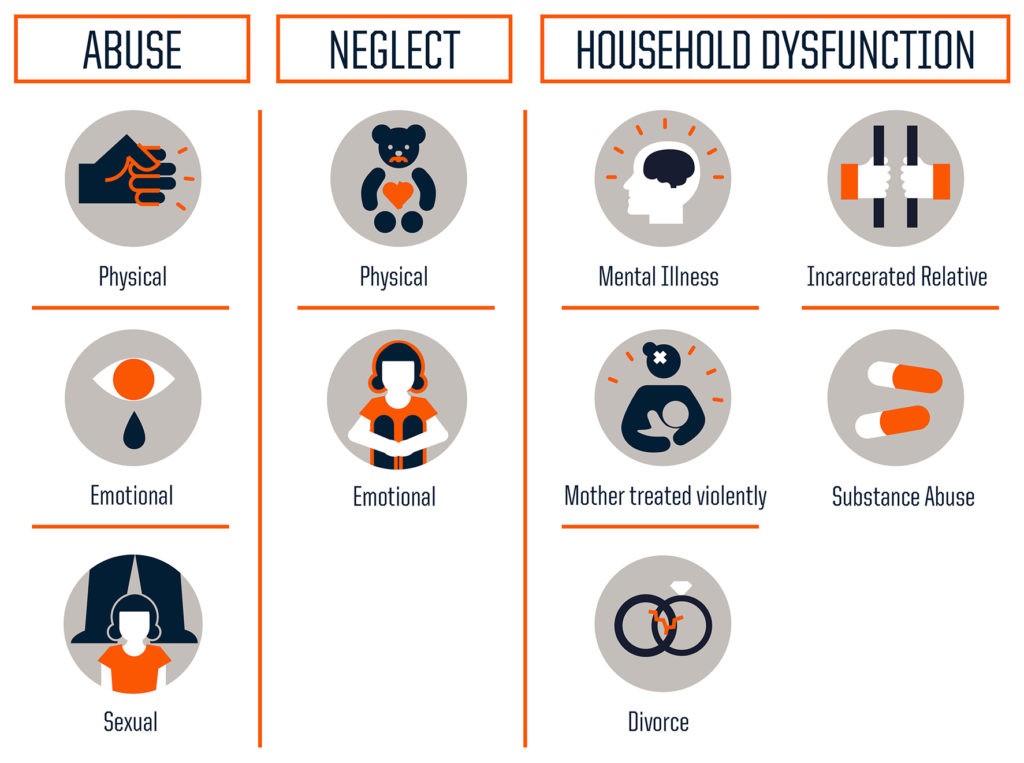Adverse childhood experiences (ACEs) are traumatic events that may occur during a child’s life. In recent years, researchers have discovered that ACEs are much more common than previously thought —impacting the lives of thousands of children and teens not only mentally and emotionally, but physically as well.
In this Q&A, Dr. Sheila Modir, a CHOC pediatric psychologist, aims to bring awareness of ACEs and offer information on health impacts and coping techniques that parents can practice with their children.
What are adverse childhood experiences?
In 1995, the U.S. Centers for Disease Control and Prevention (CDC) and Kaiser Permanente conducted one of the largest studies on childhood trauma and its impact on physical health and well-being. In the study, they inquired about a series of potentially traumatic events including physical, emotional or sexual abuse; physical or emotional neglect; and household dysfunctions like witnessing violence or substance-use problems in the home that could have happened to a child between the ages of infancy to 17 years. These traumatic events are called adverse childhood experiences, or ACEs.
The following table from the CDC depicts events that may serve as an adverse childhood experience (ACE) for a child or adolescent.

Why is talking about ACEs important?
We have always known that childhood trauma has existed, however, we didn’t realize how common these ACEs were across a diverse population. Sixty-one percent of adults surveyed across 25 states reported experiencing at least one ACE throughout their lifetime — and more and more research has indicated that ACEs are linked to chronic health problems.
With early intervention and prevention, we can decrease the risk of ACEs from occurring and impacting people at this level, says Dr. Modir. The research conducted by the CDC found that there was an exposure-response relationship with ACEs and health problems — the more ACEs people experience, the more challenges they will have in their health.
What is the impact of ACEs on children’s health?
Scientific evidence shows that when a child experiences multiple adverse events without a supportive caregiver to help them navigate this stress, they may develop long-term disruptions in brain development, immune, hormonal and metabolic systems.
For babies, ACEs can cause failure to thrive, sleep disruption and developmental delays. For school-age children, they can cause an increased risk of viral infections, asthma and challenges with learning and behaviors. For adolescents, ACEs can cause increased engagement in high-risk behaviors, teen pregnancy or substance use.
The negative health implications of ACEs can even follow children into adulthood, causing diabetes, cardiovascular disease, stroke, cancer and chronic pain.
How can we buffer ourselves from the harmful effects of stress caused by ACEs?
It is important to be aware of how stress can affect children, teens and adults, and find healthy ways to help them cope with it. The California Surgeon General recommends that engagement in these seven resources and interventions can be help mitigate the impact of the toxic stress that comes from experiencing a traumatic event.
- Practice mindfulness: Find time in your day to practice at least 10 to 20 minutes of meditation.
- Engage supportive relationships: Reach out to a friend or family member who you can talk to.
- Exercise daily: Find small ways you that can get your family moving throughout the day.
- Get sufficient, high-quality sleep: Practice good sleep hygiene by turning off electronics before bed and cutting down on caffeine and exercise close to bedtime.
- Practice proper nutrition: Try to include a variety of fruits, vegetables, and whole grains in your meals and snacks.
- Engage in metal health care: Recognize your kids’ stressors, minimize upsetting news and media, and schedule an appointment with a mental health provider, if possible.
- Access nature: Find time in your day to go outside and breathe in fresh air.
Learn how you can help your child navigate the emotional aftermath of a traumatic event.
What is CHOC doing about ACEs?
There are several ACE-related projects and initiatives at CHOC. Dr. Modir and a team of CHOC experts contribute to the state of California’s ACEs Aware Initiative — providing training to providers on ACEs-screening measures, administering screenings in their clinical practice and providing trauma-informed care.
“The more education we get out there on this topic,” says Dr. Modir, “The more we can develop trauma-informed health care and continue to provide optimal patient care for patients that have experienced ACEs.”
Get more expert health advice delivered to your inbox monthly by subscribing to the KidsHealth newsletter here.
Get mental health resources from CHOC pediatric experts
The mental health team at CHOC curated the following resources on mental health topics common to kids and teens, such as depression, anxiety, suicide prevention and more.





